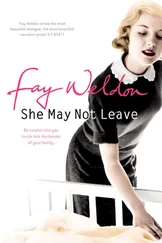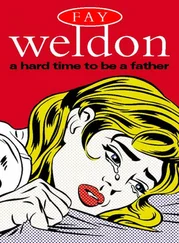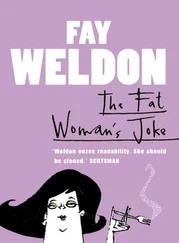She knelt beside the mattress and the idea of praying occurred to her. She put her hands together and closed her eyes. ‘Dear God,’ she said, as she hadn’t since she was seven. ‘Help me now in the hour of my need. Forgive me my sins.’ But really she had no idea how she could possibly have sinned. She had only ever done what circumstances required of her, and kept a little back for herself. Wasn’t that allowed?
No voice from God came in reply, only that of the auctioneer’s young assistant. ‘So is the bed to be in the sale or out of it?’ he asked. Trisha got to her feet at once. He would assume she had been examining the mattress: it would not occur to anyone these days that people kneeled by beds and prayed. She hoped he noticed the quality, and overlooked the stains. He spoke through his nose, though that was probably not his fault. He was in the habit of despising others, she could tell. It narrowed the nasal passages. Nothing was ever worth as much as people hoped and it gave him a feeling of superiority. He earned his living dealing in other’s people’s disappointments. He was a tall, pale, stooping young man: how did such a person come to have the job he did? She was in a perpetual state of marvel at the way the new world worked. He had qualifications, she supposed, in Art History. He had been trained to tell a Manet from a Monet, no doubt, but she did not think he would make it in the wide world. He had too little generosity of spirit. Too many planets in the lower half of the astrological chart, as hers were, to rise to great heights. Too long spent handling what amounted to repossession sales— turn up, turn up, knock down prices, everything must go. One person’s bargain is another person’s loss. Wrong end of the market, buster, down here among the totters, the knockers, the hearse-chasers, the hungry end of the dealing trade. Up the top end, Bond Street and the antique trade, and at the bottom, the skip; in the middle, eBay and the car boot sale. Look at this, darling, just right for the baby in a couple of years. What was sold early morning down the wrong end of the Portobello Road for a fiver went for twenty quid at the top, by evening. In the meanwhile the traders helped themselves to a living. Ordinary punters, idle and ignorant, never knew what they were doing: it was their role in life to be ripped off. While the professionals, the lawyers, the accountants, the designers, not to mention the daily help, helped themselves to what was left, and that was before the taxman got the lion’s share. Well, now she didn’t have to worry. It could all go. All the stuff now piled up in the garden and the front rooms, the over-shiny repro furniture, the stacks of unopened fashion magazines, the garden roller no gardener could be bothered to use, the frilly swing seats—she always thought she’d conceived little Spencer in that one—and the mirror and glass serving-trolleys with boule decoration, a snip at £7000—and the only single thing she regretted was the bed, with its used mattress. ‘I haven’t decided,’ she said to the auctioneer. ‘It might come with me.’
‘It won’t fetch much in a sale,’ he said. ‘Mattresses never do. But I could take it off your hands for a fiver. It would clean up. My girl-friend’s only got a futon.’
Perhaps he wasn’t so bad. They were all in the survival game together.
So far so good. You can start a novel like this. Lottery Winner Faces Hard Times. Rags to riches is better, but riches to rags will do. It is heartening in fiction to watch people making good, but facing up to their just or unjust desserts has its attractions too. I remember thinking this in the days of my frivolity, when I was the BBC’s darling, and anything I could think of to write they would produce, without argument or committee meetings or worry about ratings. In the days when script editors were there to make writers happy and bring them cups of tea, and not tell them what to do, and my income was great—by my standards—even though my debts were often greater. That lasted for fifteen years, on and off, and ended in the mid-Eighties.
The young auctioneer went off to harangue the men who were trying to manoeuvre a pool table from the so-called rumpus room down the stairs, and had already broken the banisters. Trisha went to the linen cupboard where a sign now said Assorted Linens—£25 and extracted an Egyptian cotton sheet from a packet of six, still wrapped, that had cost her £435 from Harrods, and used it to cover the disgrace of the mattress. Here was a decade’s worth of personal history. At least she’d had some. Many didn’t. Here was the large red wine stain where she had tried the wineglass trick and it had failed. One of the lovers—was it Gregory or Thomasina? Or one of the husbands—was it Alastair or Rollo?—had lunged at her and that had been that. Spoiled, no longer virgin. The bed had been sold on the premise of comfort and hygiene, not the bonus of sexual activity, so she could not take the manufacturers to court under the Trades Descriptions Act. She noted she had begun to see litigation as a way of raising money. She would like to be able to sue God for making her the way she was. See there, a trail of yellowish stains left by little Spencer who as a one-year-old had liked to climb into her bed and sleep there, rather than in his cot, sucking last night’s bottle.
That was in the days before Rollo claimed Trisha was an unfit mother. It was not an accusation easy to refute. She was not fit. Good mothers used mattress-covers which could be easily laundered, they breast fed not bottle fed, did not drink too much, go to bed with women if there were no men available, not even to cure a broken heart. She hoped she was a nice mother, but she knew she was not a good one.
The solution occurred to her. She would leave the bedstead and take the mattress. It was as good a memoir of her life as she was likely to get. She would go easy on herself and not start altogether afresh. The mattress would go with her to her new address in Wilkins Parade, the living room, bedroom and kitchen above a domestic services agency, called for some reason Kleene Machine, where she was now obliged to live. The landlady had promised the flat to her, though there was nothing in writing. The rent was cheap: housing benefit would cover it. The area was just about possible, still with a majority of non-ethnics. She had to face it: nothing was going to turn up in the next couple of hours to save her from the squalor of living above a shop. That kind of thing only happened when you were under forty. No former lover, no knight in shining armour, was going to gallop over the horizon and rescue her. She had no choice but to call up the landlady before she changed her mind, and say, yes, she would take the flat, she would move in at once.
It would be okay. She would make the new place into a love nest, cosy and sweet, she would pick up fabric from charity shops and drape the walls: she would drown the smell of damp and mould with scent. She had at least thirty bottles of expensive scent, all opened, all tried, most discarded. They would come with her in the van in which she would drive away from her old life and begin the new. Of course she would take the mattress; it represented her past. She would live to cavort upon it in style once more. The strength was returning to her legs. They were good legs, not as long as they could be, but shapely. Life after all was a great adventure.
I came to the riches to rags idea in a taxi on my way to a commissioning meeting at the BBC. That was 1985. I was unprepared. I would have to wing it, and did. ‘Well,’ I said, ‘there was this woman living happily in the country when…’ and made it up as I went along. Okay, they said. These days I would need to take along a twenty-page synopsis, fully-illustrated, to such a meeting and the life would have gone out of it before I even began. That was The Heart of the Country, which ended up as a TV mini-series and which I later novelised. Frivolity can be a great asset to a writer: delinquency is part of the calling. I thought it would only really interest recipients of housing benefit in the Shepton Mallet area of Somerset, where I then lived, but it ended up winning the LA Times Fiction Prize. A great many people are very conscious of riches to rags; it is their fear and, more often than you would think, their experience.
Читать дальше












